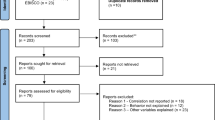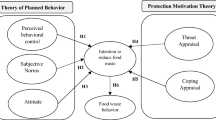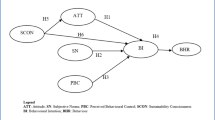Abstract
Food waste has influenced food security for poor people, food safety, economic development, and the environment. The objective of this paper is to examine the food waste reduction behavior in a sample of Iran households. The study used the Theory of Planned Behavior (TPB) as its conceptual framework and further attempted to extend the TPB by incorporating the addition of new variables (e.g., marketing addiction, the perceived ascription of responsibility, moral attitude, waste-preventing behavior, and socio-demographic characteristics). Data was gathered using a systematic random sampling technique and analyzed with structural equation modeling (SEM). The sample size used in the study was 382. The results revealed that TPB and Extended Theory of Planned Behavior (ETPB) models exhibited a reasonable fit to the data. If key goals are to predict intention to reduce food waste (IRFW), the TPB is preferable due to a smaller quantity of comparison criteria. However, if the key goal is to explain IRFW, the ETPB is preferable due to higher R2 compared with others. Besides, the variable “waste-preventing behavior” was the most significant variables influencing the intention to reduce food waste. Socio-demographic characteristics such as age, level of education, and income were found to be statistically significant predictors of intention. Finally, the implication for management and the scope for future research have been discussed.


Similar content being viewed by others
References
(FAO), 2013. Food wastage footprint. Impacts on natural resources, BIO-Intelligence Service, Food and Agriculture Organization of the United Nations (FAO), 978-92-5-107752-8. http://www.fao.org/3/i3347e/i3347e.pdf
Abdelradi F (2018) Food waste behaviour at the household level: a conceptual framework. Waste Manag 71:485–493
Ajzen I, F.M., 1980. Understanding attitudes and predicting social behavior. NJ: Prentice Hall, Englewood Cliffs
Ajzen I (1991) The theory of planned behavior. Organ Behav Hum Decis Process 50:179–211
Arbuckle, J.L., 2013. IBM® SPSS® Amos™ 22 User’s Guide. Chicago, IL 60606, USA.
Bai L, Tang J, Yang Y, Gong S (2014) Hygienic food handling intention. An application of the Theory of Planned Behavior in the Chinese cultural context. Food Control 42:172–180
Bamberg S (2003) How does environmental concern influence specific environmentally related behaviors? A new answer to an old question. J Environ Psychol 23:21–32
BIOIS, 2010. Preparatory Study on Food Waste across EU 27., European Commission (DG ENV) Directorate C-Industry, 10.2779/85947, https://ec.europa.eu/environment/eussd/pdf/bio_foodwaste_report.pdf
Bortoleto AP, Kurisu KH, Hanaki K (2012) Model development for household waste prevention behaviour. Waste Manag 32:2195–2207
Botetzagias I, Malesios C, Poulou D (2014) Electricity curtailment behaviors in Greek households: different behaviors, different predictors. Energy Policy 69:415–424
Botetzagias I, Dima A-F, Malesios C (2015) Extending the Theory of Planned Behavior in the context of recycling: the role of moral norms and of demographic predictors. Resour Conserv Recycl 95:58–67
Buchner B, Fischler C, Gustafso E, Reilly J, Riccardi G, Ricordi C et al (2012) Food waste: causes, impacts and proposals. BCFN Foundation. https://www.barillacfn.com/m/publications/food-waste-causes-impact-proposals.pdf
Diaz-Ruiz R, Costa-Font M, Gil J (2015) Are households feeding habits and waste management practices determinant in order to swing over food waste behaviours? The case of Barcelona Metropolitan4 Area., international conference of agricultural economists, Milan, Italy
Fishbein M, Ajzen I (1975) Belief, attitude, intention and behavior: an introduction to theory and research. Addison-Wesley, Reading
Gao L, Wang S, Li J, Li H (2017) Application of the extended theory of planned behavior to understand individual’s energy saving behavior in workplaces. Resour Conserv Recycl 127:107–113
Geislar S (2019) The determinants of household food waste reduction, recovery, and reuse: toward a household metabolism. In: Ferranti P, Berry EM, Anderson JR (eds) Encyclopedia of food security and sustainability. Elsevier, Oxford, pp 567–574
Graham-Rowe E, Jessop DC, Sparks P (2014) Identifying motivations and barriers to minimising household food waste. Resour Conserv Recycl 84:15–23
Gustavsson, J., Cederberg, C., Sonesson, U., van Otterdijk, R., Meybeck, A., , 2011. Global Food Losses and Food Waste: Extent, Causes and Prevention. Rome, Italy. https://ec.europa.eu/knowledge4policy/publication/global-food-losses-food-waste-extent-causes-prevention_en
Hair JF, Anderson RE, Tatham RL, Black WC (1998) Multivariate data analysis, 8th edn. Prentice-Hall, Inc, Upper Saddle River
Halder P, Pietarinen J, Havu-Nuutinen S, Pöllänen S, Pelkonen P (2016) The Theory of Planned Behavior model and students' intentions to use bioenergy: a cross-cultural perspective. Renew Energy 89:627–635
Heidari A, Kolahi M, Behravesh N, Ghorbanyon M, Ehsanmansh F, Hashemolhosini N, Zanganeh F (2018) Youth and sustainable waste management: a SEM approach and extended theory of planned behavior. J Mater Cycles Waste Manage 20:2041–2053
Hossain N (2017) Inequality, Hunger, and Malnutrition: Power Matters. Global Hunger Index. http://www.globalhungerindex.org/issues-infocus/2017.html.
Huh HJ, Kim T, Law R (2009) A comparison of competing theoretical models for understanding acceptance behavior of information systems in upscale hotels. Int J Hosp Manag 28:121–134
Karim Ghani WAWA, Rusli IF, Biak DRA, Idris A (2013) An application of the theory of planned behaviour to study the influencing factors of participation in source separation of food waste. Waste Manag 33:1276–1281
Kline RB (2011) Principles and practice of structural equation modeling, third edition. The Guilford Press, New York
Lipinski B, Hanson C, Lomax J, Kitinoja L, Waite R, Searchinger T (2013) Reducing food loss and waste. UNEP. https://pdf.wri.org/reducing_food_loss_and_waste.pdf
Lyndhurst B (2007) Food behaviour consumer research e findings from the quantitative survey. , Briefing Paper, WRAP, UK
Mondéjar-Jiménez J-A, Ferrari G, Secondi L, Principato L (2016) From the table to waste: an exploratory study on behaviour towards food waste of Spanish and Italian youths. J Clean Prod 138:8–18
Nakouzi, S.R., 2017. Is food loss an issue for Iran? United Nations Iran.
Nguyen TTP, Zhu D, Le NP (2015) Factors influencing waste separation intention of residential households in a developing country: evidence from Hanoi, Vietnam. Habitat Int 48:169–176
Papargyropoulou E, Lozano RK, Steinberger J, Wright N, Ujang Zb, (2014) The food waste hierarchy as a framework for the management of food surplus and food waste. Journal of Cleaner Production 76, 106-115. https://doi.org/10.1016/j.jclepro.2014.04.020
Quested TE, Marsh E, Stunell D, Parry AD (2013) Spaghetti soup: the complex world of food waste behaviours. Resour Conserv Recycl 79:43–51
Sánchez M, López-Mosquera N, Lera-López F, Faulin J (2018) An extended planned behavior model to explain the willingness to pay to reduce noise pollution in road transportation. J Clean Prod 177:144–154
Scherhaufer S, Moates G, Hartikainen H, Waldron K, Obersteiner G (2018) Environmental impacts of food waste in Europe. Waste Manag 77:98–113
Schmidt K (2016) Explaining and promoting household food waste-prevention by an environmental psychological based intervention study. Resour Conserv Recycl 111:53–66
Statistical Center of Iran, 2019. Population. Iran. https://www.amar.org.ir/english.
Silva JGD (2016) Food losses and waste: a challenge to sustainable development, Food and Agriculture Organization of the United Nations (FAO). http://www.fao.org/save-food/news-and-multimedia/news/news-details/en/c/429182/.
Stefan V, van Herpen E, Tudoran AA, Lähteenmäki L (2013) Avoiding food waste by Romanian consumers: the importance of planning and shopping routines. Food Qual Prefer 28:375–381
Taylor S, Todd P (1995) Understanding household garbage reduction behavior: a test of an integrated model. J Public Policy Mark 14:192–204
Tonini D, Albizzati PF, Astrup TF (2018) Environmental impacts of food waste: learnings and challenges from a case study on UK. Waste Manag 76:744–766
van der Werf P, Seabrook JA, Gilliland JA (2019) Food for naught: Using the theory of planned behaviour to better understand household food wasting behaviour. The Canadian Geographer / Le Géographe canadien 63(3):478–493. https://doi.org/10.1111/cag.12519
Visschers VHM, Wickli N, Siegrist M (2016) Sorting out food waste behaviour: a survey on the motivators and barriers of self-reported amounts of food waste in households. J Environ Psychol 45:66–78
Wahlen S, Winkel T (2017) Household food waste, in: Smithers, G.W. (Ed.) Reference Module in Food Science. Elsevier.
Yadav R, Pathak GS (2017) Determinants of consumers’ green purchase behavior in a developing nation: applying and extending the theory of planned behavior. Ecol Econ 134:114–122
Zaki M (n.d.) Reducing food loss and waste in the Near East and North Africa, Regional Conference for the Near East (NERC-32). Food and Agriculture Organization of the United Nations, Rome.
Acknowledgments
The authors gratefully acknowledge Dr. Mahdi Kolahi and all the people who completed the survey questions. In addition, special thanks go to the Faculty of Natural Resources and Environment of the Ferdowsi University of Mashhad for creating a research opportunity for us.
Author information
Authors and Affiliations
Corresponding author
Additional information
Responsible editor: Philippe Garrigues
Publisher’s note
Springer Nature remains neutral with regard to jurisdictional claims in published maps and institutional affiliations.
Rights and permissions
About this article
Cite this article
Heidari, A., Mirzaii, F., Rahnama, M. et al. A theoretical framework for explaining the determinants of food waste reduction in residential households: a case study of Mashhad, Iran. Environ Sci Pollut Res 27, 6774–6784 (2020). https://doi.org/10.1007/s11356-019-06518-8
Received:
Accepted:
Published:
Issue Date:
DOI: https://doi.org/10.1007/s11356-019-06518-8




